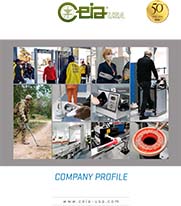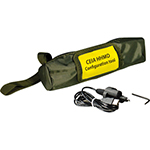SECURITY Detection
PD240CH
Dual sensing Hand-Held Ferromagnetic Detector for patient screening prior to MRI scans
Equipment rental request form
Company Presentation

ISO 9001 Certification

PD240CH
Dual sensing Hand-Held Ferromagnetic Detector for patient screening prior to MRI scans
- Large search area for faster and accurate screening operations
- High precision pinpointing by dual-tone audio signalling & dual-colour display
- Three modes of operation allow for high-performance ferrous detection, head or full body, or full metals detection in full body
- Patient safety - Mitigates the risk of an RF burn occurring in the scanner due to either Ferrous or Non-Ferrous Metals
- Dual sensing - Separate screening for ferrous metallic items or any type of metallic item
- Audible, silent-vibration, and visual-magnitude alert settings
- Customizable interface, energy-saving mode, and sensitivity
- Embedded Long Life Rechargeable Batteries are renewable energy and eliminate the Operational Cost of Alkaline Batteries
Brochures
Manuals
The CEIA PD20CH is used for precise MRI Patient Screening of ferromagnetic materials and prostheses which are dangerous in MRI scans, that can be operated in Zone 1, 2, 3.
High precision pinpointing: dual-tone audio signalling and dual-colour display, both features provide a feedback that allows high-precision localization of metal objects
The only hand-held MRI patient screening device capable of separately detecting both ferromagnetic and non-ferromagnetic metals, the PD240CH Hand-held Patient Screener provides protection from both adverse magnetic field interaction and potential RF-induced metallic heating.
Designed as a safer and more convenient than similar alternatives, the lightweight portable patient screener has three analysis modes and a control interface that can be personalized to refine analysis capabilities based on specific patient needs.
Analysis mode selection
- ALL METALS
- High sensitivity to all types of metals (implanted medical devices, prostheses, metal splinters)
- BODY
- High sensitivity to small ferromagnetic metals (ferromagnetic fragments, surgical instruments)
- Insensitive to large non-ferromagnetic metal items (large prostheses)
- HEAD
- High sensitivity to very small ferromagnetic metals (small ferromagnetic fragments)
- Insensitive to medium size non-ferromagnetic metal items (non-ferromagnetic dental implants, small prostheses)
Download Specifications
Power Supply
- PD240CH: 2 x AA size Ni-MH, 2500mAh rechargeable batteries
- HHDS-CH Docking Station: AC/DC adapter: 100-240V~, 50-60Hz, 200 mA
Control Panel
- Optical and acoustic signalling modes
- 3-Level Sensitivity selection
- ALL METALS (ferromagnetic and non-ferromagnetic metals)
- BODY (small ferromagnetic metals)
- HEAD (very small ferromagnetic metals)
Detection and Operational Functions
- Customizable via HHMD Configuration tool
Battery
- Battery life (AA NiMH batteries 2500mAh)
- ALL METALS > 50 hours
- FERROUS METAL BODY > 20 hours
- FERROUS METAL HEAD > 20 hours
- Low battery indicator
Operating temperature
Storage temperature
Relative humidity
- 0 to 98% (without condensation)
Dimensions
- PD240CH 15.9” x 4.7” x 1.6”
- HHDS-CH Docking Station 6.9” x 4.5” x 3.4”
- Carry Bag 17” x 13.4” x 4.1”
Weight
- PD240CH 1 lb (with battery)
- HHDS-CH Docking Station 1.66 lbs (with power adapter)
- Carry Bag 6.3 lbs (with equipment)
Compliance
- Conforms to the applicable international standards for safety, EMC and to the applicable CE regulations
Safety features
- Manufactured in shock-resistant technical polymers
PD240CH detecting set
- Hand-held Patient Screener
- HHDS-CH desktop docking station
- Detection Verification (Test Piece: part # 72131)
- Discrimination Verification (Test Piece: part # 72132)
- Instruction manual / Certificate of Calibration
- Universal AC adapter
- US, EU, UK, JP plugs
- Extensible restraint cable
- Carry bag
Options / Accessories
- Patient screener configuration tool: setting up the Hand-held Patient Screener via USB PC-HHMD connecting cable and GUI application software: part # 63537
Analysis mode selection
- ALL METALS
- High sensitivity to all types of metals (implanted medical devices, prostheses, metal splinters)
- BODY
- High sensitivity to small ferromagnetic metals (ferromagnetic fragments, surgical instruments)
- Insensitive to large non-ferromagnetic metal items (large prostheses)
- HEAD
- High sensitivity to very small ferromagnetic metals (small ferromagnetic fragments)
- Insensitive to medium size non-ferromagnetic metal items (non-ferromagnetic dental implants, small prostheses)

HHMD
Allows the connection of the Metal Detector to PC, via USB port.
Includes special USB adapter with cable, GUI application software, tool for battery cap removal.
Part Code: # 63537
Brochures
Manuals
Certificates